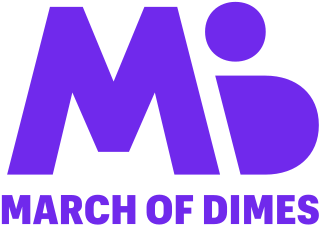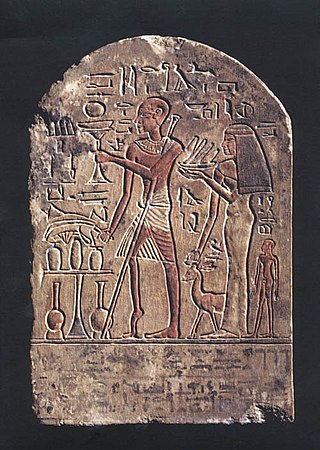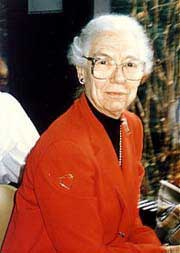Related Research Articles

Easterseals is an American 501(c)3 nonprofit providing disability services, with additional support areas serving veterans and military families, seniors, and caregivers.

March of Dimes is a United States nonprofit organization that works to improve the health of mothers and babies. The organization was founded by President Franklin D. Roosevelt in 1938, as the National Foundation for Infantile Paralysis, to combat polio. The name "March of Dimes" was coined by Eddie Cantor. After funding Jonas Salk's polio vaccine, the organization expanded its focus to the prevention of birth defects and infant mortality. In 2005, as preterm birth emerged as the leading cause of death for children worldwide, research and prevention of premature birth became the organization's primary focus.

The CNIB Foundation is a Canadian charitable organization and volunteer agency dedicated to assisting Canadians who are blind or living with vision loss, and to provide information about vision health for all Canadians. Founded in 1918 as the Canadian National Institute for the Blind to assist soldiers who had been blinded in the First World War, CNIB originally offered sheltered care and specialized employment to people with vision loss. It has since expanded to include other programs and services, including research, public education, rehabilitation counselling and training, advocacy and an alternative-format library for people living with a print disability. It is a member of the Braille Authority of North America.
In Canada, Easter Seals is a group of charitable organizations which supports the development and advancement of people who are living with different types of disabilities. Founded in 1922 by a group of Rotary Clubs, it sought to emulate the success of the American Easter Seals program.
The India Health Initiative (IHI) is a student-run initiative operating in several universities in Ontario, Canada, which aims to send health care professionals and students to various regions in rural India for developmental and educational volunteer work.

Toronto Rehabilitation Institute is the largest rehabilitation hospital in Canada. Owned and operated by the University Health Network (UHN), Toronto Rehab provides patients with rehabilitation care, helping people rebuild their lives and achieve individualized goals following injury and disability. It is composed of five sites across Toronto, which are: Bickle Centre, Lakeside Centre, Lyndhurst Centre, Rumsey Centre, and University Centre.

Rancho Los Amigos National Rehabilitation Center is a rehabilitation hospital located in Downey, California, United States. Its name in Spanish means 'Friends' Ranch'.

Rehabilitation International is an international disability rights organization with member organizations in every region of the world. The RI secretariat is located in New York City.

March of Dimes Canada (MODC), officially the Rehabilitation Foundation for Disabled Persons, Canada is a registered national charity established in 2005 by Ontario March of Dimes. MODC aims to provide community-based rehabilitation services and resources across the country to people with physical disabilities.

Just Energy Group Inc. is a Canadian-based natural gas and electricity retailer operating in Canadian and American markets across North America.

The history of polio (poliomyelitis) infections began during prehistory. Although major polio epidemics were unknown before the 20th century, the disease has caused paralysis and death for much of human history. Over millennia, polio survived quietly as an endemic pathogen until the 1900s when major epidemics began to occur in Europe. Soon after, widespread epidemics appeared in the rest of the world. By 1910, frequent epidemics became regular events throughout the developed world primarily in cities during the summer months. At its peak in the 1940s and 1950s, polio would paralyze or kill over half a million people worldwide every year.
Post-Polio Health International (PHI) is a relatively new name for a non-profit organization that officially began its work in 1960. For many years it was known in medical, rehabilitation, and disability circles variously as GINI, or the International Polio Network, or the Rehabilitation Gazette Network, or more familiarly as Gini’s Network, in honor of Gini Laurie, its founder and driving force until her death in 1989.
The International Ventilator Users Network (IVUN) is a nonprofit network of mechanical ventilation users, respiratory health professionals, and ventilatory equipment manufacturers. Its focus is on the health and independent living of ventilator users, whether they are using assisted ventilation long-term – at home or in nursing facilities—or short-term in emergency rooms and critical care units.

Virginia Grace Wilson "Gini" Laurie was a central figure in the 20th century development, in the United States, of the independent living movement for people with disabilities. It is sometimes said that she was one of its two "grandmothers"—the other one being Mary Switzer, who was in charge of vocational rehabilitation at the national level from 1950 to 1970.

Crotched Mountain Rehabilitation Center is located in Greenfield, New Hampshire, United States. It began as a rehabilitation center for children with polio and over the years has evolved into one of New Hampshire's largest human services organizations, serving day and residential students with disabilities at Crotched Mountain School, young children with autism in its Ready Set Connect school-readiness programs, and adults with unique needs through Crotched Mountain Community Care.
TIRR Memorial Hermann is a 134-bed rehabilitation hospital, rehabilitation and research center, outpatient medical clinic and network of outpatient rehabilitation centers in Houston, Texas that offers physical rehabilitation to patients following traumatic brain or spinal injury or to those suffering from neurologic illnesses.
The Rehab Group is an international not-for-profit organisation providing health and social care, training and education, rehabilitation, employment and commercial services. Operating primarily in Ireland and the United Kingdom, it was originally established in 1949 as the Rehabilitation Institute, and provided training services to people with tuberculosis. In 2014 and 2015, a number of controversies involving the Rehab Group resulted in the resignation of the organisation's then CEO, a reduction in donations to several charities, and changes to the regulation of charities in Ireland.
The Courage Kenny Rehabilitation Institute is a rehabilitation medicine institute in Minneapolis, United States.

Betty Dubiner was a Canadian-born Israeli, who was instrumental in obtaining vaccines for the new nation of Israel to combat a polio epidemic and the development of programs to assist disabled people. Founder of the organization Ilenshil-Polio, which later became the Israeli Association for Children with Disabilities (ILAN) and the Israel Sports Center for the Disabled, she was recognized with the President's Award for Volunteerism in 1988, for her contributions to Israeli society.
References
- ↑ Evans, Bret (2015-01-03). "A marching dime". Canadian Coin News. Retrieved 2023-02-22.
- ↑ Galer, Dustin (2018-01-01). Working towards Equity: Disability Rights, Activism, and Employment in Late Twentieth Century Canada. University of Toronto Press. p. 36. ISBN 978-1-4875-2130-1.
- ↑ "Toronto woman charged in $800,000 March of Dimes fraud". thestar.com. 2015-11-23. Retrieved 2023-02-20.